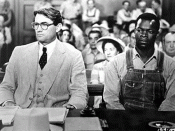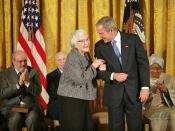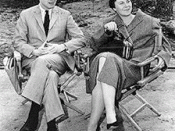Prejudice has become such an active part of everyone's lives that not many people recognize the harsh corruptness behind it. The imperceptible animosity causes dilemmas in society that influences the lives, and even causes deaths of innocent victims.
In To Kill a Mockingbird, by Harper Lee, the townspeople fail to notice the "the senseless slaughter of songbirds"ÃÂ (Ch. 25) that their racism has caused. Tom Robinson's life is snatched by the greedy hands of prejudice, which belong to Bob Ewell. Not only does his selfishness, to restore his family's reputation, cause Tom's death, but his own as well.
Correspondingly, prejudice has caustic consequences in our real life as well. Bigotry and racism is customarily evident, but no one tries to banish this pitiful disgrace from our society. Children, even at the age of five, are being influenced by racism in subtle ways. The parents might tell their child not to play with certain children, because of their race.
Rules like this may seem harmless, but the child they might grow up with this intolerance towards the other race. Not only does racism affect individuals, but society as a whole. Our beliefs and morals are altered, because we believe what society believes. Prejudice is a part of our world that cannot be erased, unless everyone can accept each other's differences.





